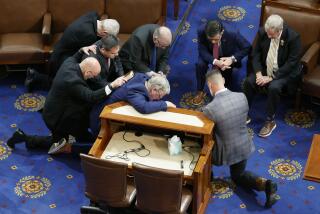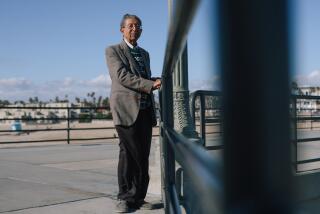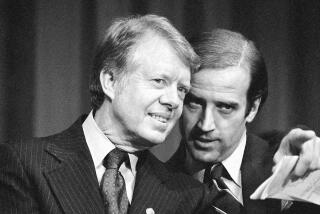Civic Life, With Spirit
- Share via
The ouster of Ronald F. Thiemann as dean of the Harvard Divinity School comes ironically at a time when the ideas he has represented on the interaction of religion and democratic society are having an impact on the American political process. That we now have liberals, moderates and conservatives shaping the debate on this issue is a healthy thing for a diverse country on the verge of a new century. The discussion goes on, with or without Thiemann, who lost his post over the discovery of pornography files on his university-owned computer.
This week, Vice President Al Gore joined the chorus of politicians, until now mostly Republican, calling for the government to work more closely with religious charities to deliver social services to the needy. It was the latest in a line of instances where the Clinton administration sought to encourage the cooperation of religion and government, and it is likely to ensure that the place of faith in American life will be part of the public policy debate of the next presidential campaign.
Mainstream politicians of both major parties now are searching openly for ways in which religious organizations in partnership with government can address society’s problems while still honoring separation of church and state. This has been supported by the work of interfaith groups in Washington and local communities in Southern California and elsewhere that have sought to focus on the needs of welfare recipients, the hungry and the homeless and on labor issues.
Until fairly recently, the debate about values in America was dominated by conservatives seeking constitutional amendments on such issues as abortion and prayer in public schools. These political initiatives increasingly have been answered by moderates seeking to find a constitutionally permissible role for religious values in what has been called “the public square.” The extent of interest in religious expression on the political landscape was evident in the overwhelming support in Congress for the 1993 Religious Freedom Restoration Act, later struck down by the Supreme Court as a legislative intrusion on judicial prerogatives.
Mindful that the Supreme Court has been wrestling with how a diverse nation can cope with faith communities under the umbrella of democracy and the Constitution, Thiemann’s 1996 book, “Religion in Public Life: A Dilemma for Democracy,” pointed up inconsistencies in the court’s efforts to apply such tests for government as neutrality toward religion. It challenged the court to think in new ways about making a place for religion in the delivery of education and other public services.
Two years ago, a two-day seminar at Fuller Theological Seminary in Pasadena attracted a group of religious thinkers in an unusual juxtaposition: Thiemann, a liberal, and Rabbi A. James Rudin of the American Jewish Committee exchanged views with religious conservatives on pluralism in the future. Their work together on this panel was a good sign for harmonious religious diversity.
There are many other examples of a bubbling debate. We have ferment over religious and civic life in the three branches of government, in local communities and in academic centers. This is a mark of a confident democracy reconsidering how civil life is to be conducted.
More to Read
Get the L.A. Times Politics newsletter
Deeply reported insights into legislation, politics and policy from Sacramento, Washington and beyond. In your inbox twice per week.
You may occasionally receive promotional content from the Los Angeles Times.










